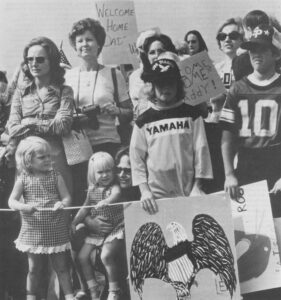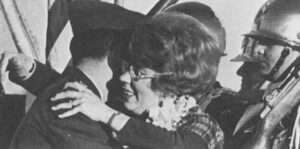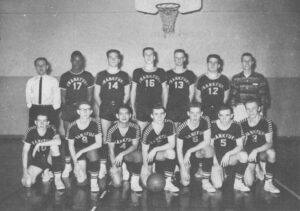(WASHINGTON, DC) – When Elizabeth Custer journeyed with her husband to the Dakota Territory in the spring of 1873, Army wives had the status of camp followers. Official regulations entitled servants and laundresses to better treatment than wives, as Mrs. Custer complained in her memoir, Boots and Saddles. During the Indian campaigns, the Army garrisons on the western frontier provided family quarters only for senior officers, and the primitive living conditions discouraged all but the most intrepid wives.
In peacetime the hardships of military family life were tempered by an elaborate and prescribed social circuit. The West Point graduates who dominated the officer corps fashioned a way of life they thought appropriate to an aristocratic elite. One legend from the days of the “Old Army–before the democratizing influence of World War II-warned a captain’s wife not to plant roses by the front door. If she made her yard too attractive, the wife of a senior officer might decide to pull rank and take over the quarters.
Although such hierarchical excesses disappeared long ago, many traditions of the Old Army persist with surprising strength. Despite the women’s liberation movement, the volunteer army, and other challenges to military convention, underlying assumptions about the proper role of the wife remain relatively unchanged. Although the military makes some demands on all wives, the officer’s wife is the most subject to the expectation that she be a “good soldier whose sense of Duty, Honor, Country are those of the Army itself.” (The Officer’s Guide)
The Essential Handbooks
The military way of life is described in a variety of handbooks, official and unofficial, designed to initiate wives into service customs and traditions. These books instruct the military wife on the many ways she is expected to rise to the occasion, whether its requirements demand the mastering of an elaborate social protocol or the prompt execution of emergency measures in the event of enemy attack. Even in the “New” Army, West Point graduates still present their June week brides with that unofficial “social bible”, The Army Wife, which, in the latest edition, offers detailed instruction for a variety of social events- including five pages outlining the choreography of the formal call! Wives are advised to be certain that their calling cards are absolutely correct, since “often people see your card before they see you and if your card is peculiar, they may think you are peculiar also.”
The sternest injunctions may have softened in recent years, but, according to these handbooks, it is still apparent that the wife’s duty is to shape family life to the requirements of the professional mission. For a family constantly on the move, social regimentation provides a substitute for continuity of place. Wives are expected to maintain these traditions and thus to serve as unofficial guardians of the prized esprit de corps.
“Independent Dependents”
Recent editions of The Army Wife and The Officer’s Guide portray the perfect military wife as a woman with all the skills of the traditional helpmate plus the ingenuity required to master the preparations of caribou meat should her family be stationed in Alaska. She is an “independent dependent” who must be capable of standing on her own two feet while her husband is away and yet willing gracefully to relinquish that role upon his return. She must take care not to spoil children through “misguided mother love” lest her husband’s commanding officer attribute any bad behavior to their father’s lack of discipline or leadership qualities. She must learn, among other things, never to distract her husband at work with the news that “Butch fell out of the tree house and broke his arm. The arm will heal, but a mistake in judgment on the part of her husband may claim several lives,” the Army Wife instructs. The Army Wife is expected to possess social graces and charm and to spread her charm over an Army post which “otherwise might be drab indeed.” In her travels from place to place, she is advised to develop a “knack for talking about topics of general interest” when thrown in with strangers, always remembering to beware of politics. “Indiscreet babbling” is also to be avoided-“it has sidetracked many an Army man’s career,” according to the Army Wife. As a security measure, the wife is cautioned never to “be guilty of talking about where your husband is going or from where he has just returned.” (One wonders whether the purpose of such secrecy is to enhance the mystique of the military, to encourage wives to regard their husband’s work as an exalted calling, to which they must subjugate their own needs and desires.)
The ambitious wife is told she can assist her husband’s career advancement by creating the proper background for him. (In military etiquette handbooks, a wife’s ambition is inevitably equated with her husband’s career.) For instance if he is the “rough and ready” type, the clever wife is supposed to smooth his way by contributing the social grace and charm he lacks. The Officers Guide advises that “the wife of an officer exerts a powerful influence on his career…She can be an asset or a burden; an inspiration or a stone around his neck.”
These days more wives are opting to be a stone, telling their husbands if they want to “make general,” they’ll have to do it on their own. That may not be easy. According to a directive in effect as recently as the mid-seventies, the worthiness of a man’s wife is an appropriate consideration in reviewing promotions to the rank of brigadier general. The February 5, 1979 issue of The Army Times Magazine ran a debate on the question, “Should a Wife be Considered in her Husband’s Ratings?” Army wife Elizabeth S. Wallace argued no. On some “backwater bases” she wrote, “the climate still exists where women who conform to the traditional military wife role are viewed as paragons and credits to their husbands, while those of us who don’t are dismissed as albatrosses around their necks.” Col. William Taylor took the affirmative side of the question. (According to an identifying note, Col. Taylor is the officer who regularly writes efficiency reports about Wallace’s husband.) In a sound marriage, Taylor argued, a wife will not “resent and shun the requirements of her husband’s duty.” It’s her job to maintain “the background harmony generally required for the married soldier’s motivation to do his job.” Taylor also reminded his readers that, “the Army cares about the years of support wives give the nation’s soldiers. Noting that, “Upon a soldier’s retirement his wife receives an official Department of the Army certificate of Appreciation signed by the Chief of State,” he added, “If you don’t think that is important, go watch a wife receive one at a retirement ceremony.”
An Elaborate Social Milieu
The officer’s wife and children are expected to participate in the elaborate social milieu of the military; and if a wife chooses to operate outside the social web, it can damage her husband’s chances. In The Professional Army Officer in a Changing Society, (Nelson-Hall, 1975) Sam Sarkesian has written that the effect of such isolation “on an officer’s career can be serious, although attempts have been made publicly to deny this when official review is made of professional competence. The fact that the military is a total institution makes it very difficult to distinguish between private and professional life.” What this can mean to a wife struggling to shape an independent identity is suggested by a chilling footnote in an article by two sociologists. In “The Army Officer’s Wife: Social Stresses in a Complementary Role“, Ellwyn Stoddard and Claude Cabanillas noted that physical illness is one of the few acceptable reasons a wife can use to be excused from the official and unofficial obligations of life on a military base. The authors suggest that a research project is “badly needed in the military medical field … to ascertain how much of the outpatient care, visits, and medicines dispensed to military wives are to legitimate their avoidance of their military wife duties. A claim of perennial sickness is much less questionable if supported by regular doctors visits…” A military researcher wishing to undertake such a study probably would have little difficulty obtaining the medical information. Within the total institution of the military, the confidentiality of the doctor-patient relationship is an elastic concept. The Army Times Magazine (June 18, 1979) told wives considering visiting a base psychiatrist or psychologist that under certain circumstances military officials with a “need to know may have health information about you divulged without your express approval.”
Women’s Liberation Along With Recipes
There is some discussion within the Army today about the need to change the traditional role of military wives. Magazines for service families now include sympathetic articles about women’s liberation along with the recipes and advice about moving. The National Archives held a conference in May on “Soldiers and Civilians: The United States Army and the American People.” A former military wife, Elizabeth Finlayson, spoke on “Perceptions of the Army Wife: Her Role in a Changing Society.” Mrs. Finlayson shared 23 years of Army life with her husband before he retired and says she “dearly loved the service.” A tall woman with a dry sense of humor, Mrs. Finlayson resembles a slightly less exuberant Julia Child. Before she married, Finlayson taught physical education in college. Seventeen years after interrupting her own career to follow her husband, she returned to George Washington University where she earned a Doctorate of Education in guidance and counseling. She wrote her dissertation on the academic and employment status of the Army wife.
At the conference, Mrs. Finlayson reported that frequent transfers make the pursuit of a serious career nearly impossible for a wife. She has personal experience with the problems she writes about: in the middle of her research her husband was ordered to Germany, though she was able to complete her research in spite of the disruption. While she suggests ways to improve the lot of Army wives, she stops short of calling for major changes such as modifying the rotation system that requires military families to move every two to four years. She insists that “wives are civilians who happen to be married to husbands who are in the military,” but old habits persist, and she still catches herself talking about “when we got our promotion” or “when we retired.”
The Proper Role
Mrs. Finlayson’s mild pleas that, “It’s time we stopped thinking of the Army wife in a demeaning female stereotype” provoked a long debate about the proper role for the wife of an Army man-which centered on the question, as one audience member put it, “Is the Army wife an asset?”
A young captain from the Military Academy asked if a wife was “something the Army should encourage as contributing to her husband’s productivity or is she something that should be discouraged?” Ernest Fisher, of the Army’s Center of Military History, offered an historical perspective: “Throughout much of the 19th century,” he explained, “each company was authorized four laundresses who did the laundry for the company and they were generally married to noncommissioned officers. They were also employed if not as laundresses as cooks and housekeepers in the households of the senior officers on the post. So to answer the question in the mid-19th century, those wives were definitely assets to their husbands.” As for the dissatisfaction of some military wives today who find it difficult to pursue careers, Fisher made the following modest proposal: “Maybe the answer is to seek an activity for the modern officer’s wife that would be comparable to the laundresses.”
Later in the discussion, some participants called for more study of the question. As one man said, “We need a military personnel policy to determine whether or not the wife is an asset.”
An Ironic Coincidence
Another member of the audience noted an ironic coincidence. That very morning The Washington Post had published a front-page article with the title, After a 20-year Hitch, She’s Out of a Job. It told the story of Eleanor Peterson, the divorced wife of a man who had just become the first black general in the Marine Corps. Mrs. Peterson recalled that, during her years as a service wife, she had entertained so much that her house “looked like a little officers club.” Before the marriage broke up, Mrs. Peterson had devoted herself to her husband’s career- apparently with much success. The Marine Corps, she says, used to grade wives on how well they performed, and she always got high marks. “All those fitness reports said I was a fantastic asset to this man,” Mrs. Peterson told the Post.
©1979 Ann Banks
ANN BANKS begins her APF Fellowship study on the Military Family with this issue.




